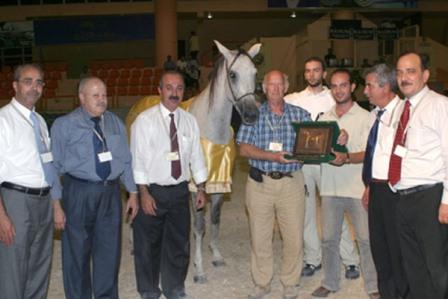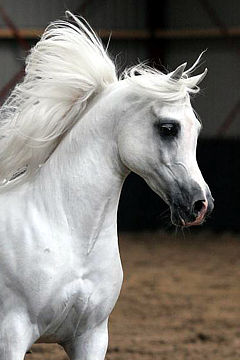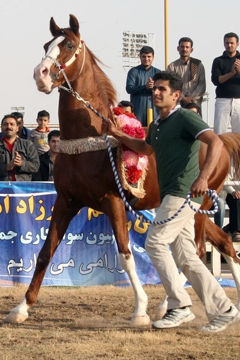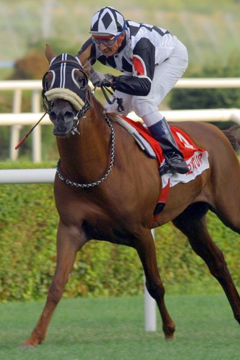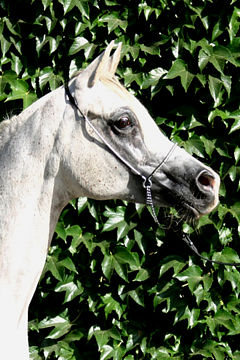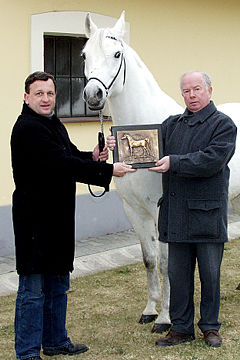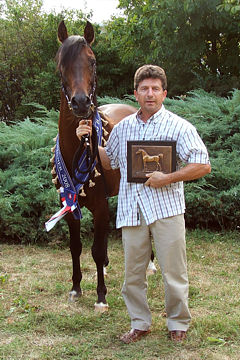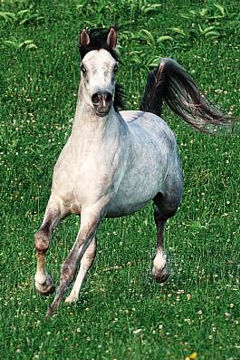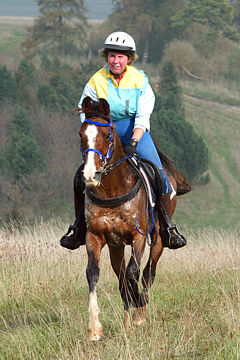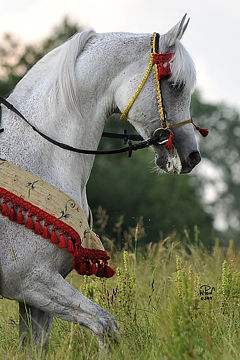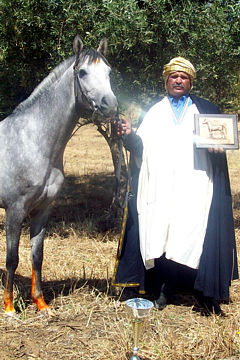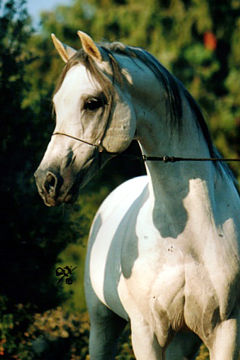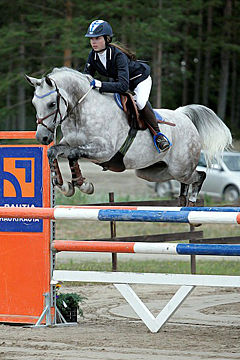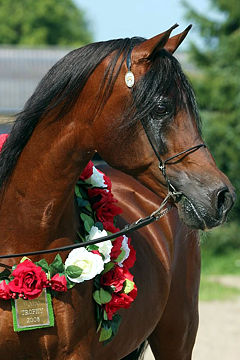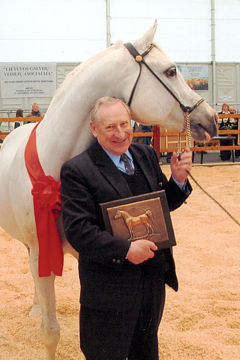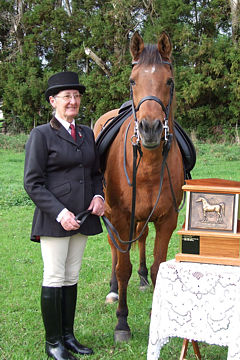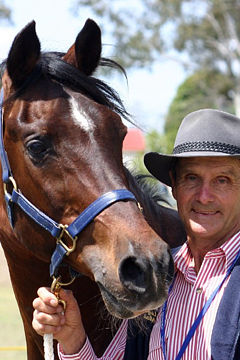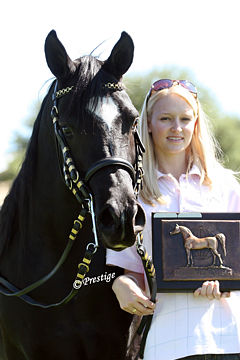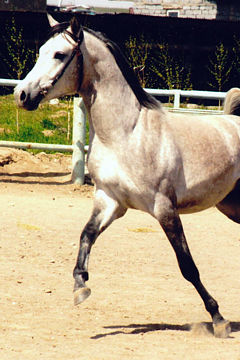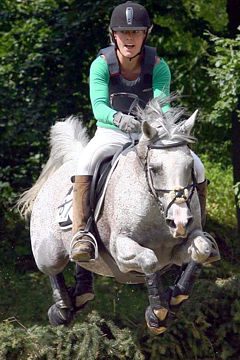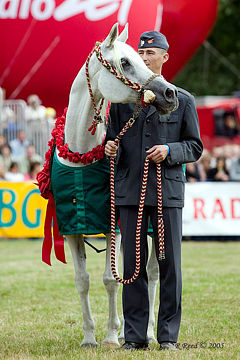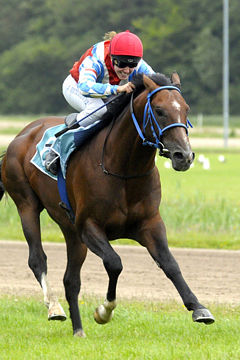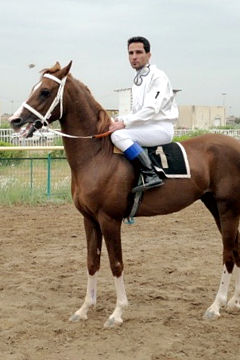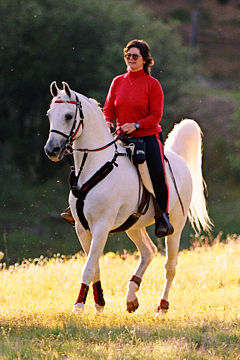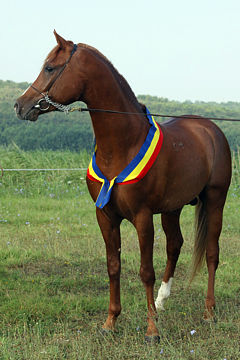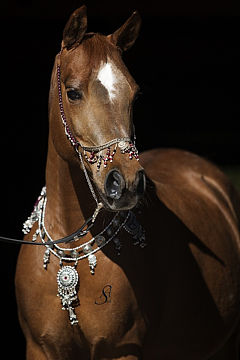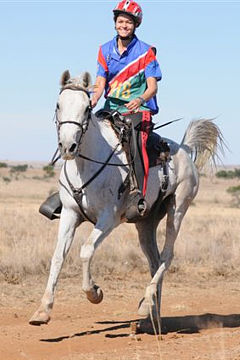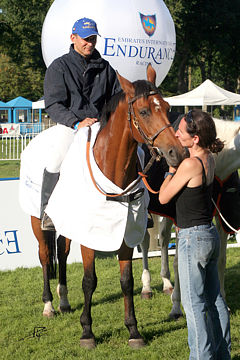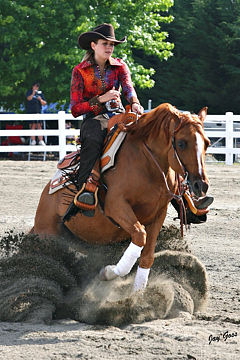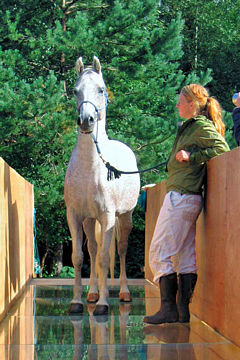![]()
Member Report from Syria
REPORT MADE AT THE 2019 WAHO CONFERENCE:
Katrina Murray (Reading Report on behalf of Syria): I will read an abbreviated version of what Engineer Mohamed Ghiath Al-Chaieb would have read had he been able to be here with you today, or Basil Jadaan.
The Ministry of Agriculture and Agrarian Reform dates back to the 1950s. The Ministry had equine vaccination centres for the original Arab tribes distributed in various Syrian governorates and cities from 1950 to 1960. After approval of their stud books by WAHO, the Syrian Association for Arabian horses was established in 2003, the first President being Basil Jadaan, for developing plans and strategies of action which oversaw all activities of the Arabian horse in Syria in cooperation with the Stud Book Office Ministry of Agriculture. So, one could say that the golden period for activities in Syria was between 2004 to 2010. They had flat races for example in the cities of Damascus, Lattakia and Hama and they also had halter shows, endurance competitions and auctions, as well as horse exhibitions which took part in all Syrian provinces and cities at their big agricultural fairs.
The Syrian Arab Horse Association is an ECAHO member, their shows were held under the ECAHO rules up to 2010. They also organised a work and educational programme with seminars and so on, and I think many of you here today will remember that they hosted the 2007 WAHO Conference in Damascus which was very successful. Without going into too much detail, all those activities and efforts that they had made up to that point stopped in 2011.
I am now going to jump to the year 2018, which is what they really wanted to report to you. 2018 was a distinguished year for the Syrian Arab horse and its activities in Syria. The members and committees of the Office of Arabian Horses contributed in the re-control and relocation of the movement of the Arabian horse in Syria in cooperation with the breeders and owners in most hot spots and the registration of Arabian horses continued. They were able during the years 2016, 2017 and 2018 to make three visits to the eastern region of Syria and the province of Hassakah and Qamishli, which are source areas where the Bedouin tribes are particularly found including the Shammar, Tai, Al-Jboor, Iqaidat, Anezah, Al Naim and others. During that period a total of 2,200 horses were found, and they used freeze branding even in what he calls in his report are hot spots. I don’t think I need to explain what that means. Of that number 1,022 were freeze branded in the year 2018. They have always used the freeze branding and they still do, because it is an instant visual record that it is a registered Arabian horse. Of course, they are also DNA typed and parent verified. The total number of Arabian horses is now 8,388. They issue passports, all the usual things, and they have published regular stud books and they are up to date, they actually published three in 2018, they are all available on .pdf and can be sent to you by email if they have not already sent them to you.
The partial international ban on export of horses from Syria was lifted by international agreement, they can now come in and out through Lebanon. They have recovered 72 stolen horses, most of them in 2017 and 2018. 22 of them were from the Ministry’s State Stud that was near Damascus, and the rest went back to their individual breeders. They were returned after being identified by their freeze brands and confirmation of the ownership.
They have held an Arabian Horse Festival, which they actually have done for the past four years which includes the Greater Damascus March on Horseback through the streets of Damascus, and a race for registered Arabians. They have a Supreme Committee for racing, they have now re-started horse racing in both Damascus and Hama governorates. They had a special section for Arabian horses at the Damascus International Fair in 2018 which included a parade of Arab horses ridden from Damascus to the site where the exhibition was held, with 55 riders on their Arabian horses, which attracted a lot of attention. They then held an auction at the end. They have now restarted their shows, the first one was in 2018, I am not sure if anybody here was a judge at that show, but they had an ECAHO show with international judges and that was held late last year. It was all very much restarted by Basil Jadaan, who is the Honorary President of the Syrian Arab Horse Association. At the show they had 107 entries, of which 67 were of pure Syrian origin, and on the second day they had a separate section for horses of non-Syrian Arab origin with some imported bloodlines. Obviously, prizes were delivered.
Finally, and if anyone is interested we can certainly give you all the statistics afterwards, but in 2018 the number of registered breeders was 1,416, the number of births of foals was 800 which was up from 646 in 2017. Going back to 2014, when it was very much harder to get around the country, only 99 foals were found and registered. All the DNA is done, and all the freeze marking, they estimate a total of 8,388 registered horses. Stud books are up to date. There were no imports or exports in 2018, there were 7 exports and 1 import in 2017. There were quite a few exports in 2015, a lot of horses went to Lebanon, some are known to be in Turkey and some are known to be in Iraq and they have been located. They just wanted you to know they were very sorry they could not be here to inform you themselves of their restarted activities. Thank you very much.
REPORT AT 2017 WAHO CONFERENCE:
Mr. Mohammed Ghiath Al-Chaieb, Syria: (translated from Arabic). We extend our great thanks to the organizing committee of the Conference, the Executive Committee, the President and Members of WAHO, special thanks for inviting us to participate in the light of the crisis in Syria. I am Mohammad Ghiath Al-Chaieb, Director of the Office of Arabian Horses in Syria, the official registration authority of WAHO.
Despite the circumstances of the unjust and cruel war being waged on the people and civilization and the state in Syria, we have been able to maintain this noble and important Arabian horse as a national treasure, through an unlimited governmental support by the Minister of Agriculture and Agrarian Reform and Mr. Basil Jadaan, Member of the Executive Committee of WAHO.
We confirm the horses pedigrees after examining the DNA, despite the ban imposed on us, through a personal cooperation with all the departments concerned about the Arabian horse in Syria, particularly the Syrian Arabian Horse Society and the Syrian Equestrian Federation. During the past two years we have registered 2,500 horses after parent verification by DNA, and we currently have 450 new horses to be registered after completion of examining their DNA in the laboratory in Germany.
We have issued written pedigrees of horses after a three year pause since the beginning of the war, where we issued volumes 12, 13, and 14 of our studbook, and at the beginning of this year we issued volume 15. We have distributed copies of it to the delegates here in this Conference and it is available to everyone on our website. Each book includes 500 horses. The number of Arabian horses registered in Syria is 7,000, except for the missing ones, and this year we will be following up printing the stud books until we get to those born in 2016, noting that we are consistently working on updating our database.
We inform you that we have lost during the war a third of the number of Arabian Horses, where the missing of which is estimated up to 3,000 horses. The armed gangs destroyed the Centre of Martyr Basil al-Assad for Breeding of Arabian Horses, the Syrian State Stud, on an area of 150 acres, which included six barns of horse stables, accommodating about 250 Arabian Horses. The number of theft and loss of horses from this Stud is 197, from the rarest strains of Arabian Horses of Syrian origin. A meeting room for 300 people, a hotel with ten rooms and all the equipment for artificial insemination and a semen storage bank were destroyed. Eight residential buildings for workers, technicians and engineers’ families who worked in the Centre were also destroyed, including the destruction of the administrative building and the theft of all equipment, vehicles and electricity generator.
At the beginning of 2016, through a governmental financial support, an alternative barn with twenty stables with all its accessories, for re-starting the breeding of Arabian Horses in the Ministry of Agriculture, was built at the Damascus racecourse. Six horses which were stolen from the Center have been returned, and we are constantly communicating and providing financial rewards for the return, or help in the return, of stolen horses. As we have always had the tradition of using freeze-branding, we could re-identify these stolen horses, stolen not only from the Ministry, but from the stables of our private breeders, because nobody can amend or remove these freeze brands. This method also helps us to re-identify any horses stolen or smuggled through the borders.
After a two-year break of making any activities such as shows and racing and endurance we could, thanks to God, reorganize several flat races in cooperation with the Syrian Arabian Association at the Damascus racecourse where we organized the following races: In 2014, we organized four races for the registered Arabian horses only for short distances 1000m, 1400 and 1600m. In 2015 and 2016, we organized eight races for registered Arabian horses only for the same distances.
For the first time, in order to support the activities of Arabian Horse, materially and morally, we organized the First and Second Arabian Horse Festival during the period 15/04/2015 and 13/04/2016 under the auspices of the Minister of Agriculture and Agrarian Reform, Engineer Ahmad Fatih Al-Kadri. These festivals were attended by the equestrians of El-Sham Club and equestrians of Police and equestrians of the Syrian Arabian Horse Association and equestrians of Martyr of Basil al-Assad Association for the Breeding of Arabian Horses and the future jockeys of the Jockey Club. In addition to the festivities, we organized 6 flat races for registered Arabian horses, under distinct sponsorships for the distances of 1000, 1400, 1600 and 2200 metres.
We have produced an international passport for the Syrian Arabian Horse that is allowing its movement under the internal security conditions, and for export, it also helps us to protect the horse from being stolen. I reiterate my thanks to all who contributed in the organization and success of this Conference. Thank you for your attention. (Applause).
REPORT AT 2011 WAHO CONFERENCE:
Ladies and Gentlemen, my name is Basil Jadaan, I have been assigned to read this report
submitted to your esteemed Conference from Mr. Mohammad Al Wadi, Director of the Arabian Horse Office at the Ministry of Agriculture, he is normally the Syrian delegate and he extends his warm greetings and apologizes for not being able to attend this Conference. I would first of all like to extend my sincere thanks and appreciation to the State of Qatar for their warm hospitality and for ensuring the success of this Conference, which is proper for an Arab country hosting a Conference dedicated to the Arabian horse which is part of our heritage that we are proud of.
The Arabian Horse Office of the Ministry of Agriculture is responsible for the registration of Arabian horses under WAHO rules. We have issued volume 10 of the studbook and it was distributed to all registering authorities, and the next volume is in progress which will include another 300 horses, this will cover the period until 2008. All the foals born up to 2010 have been DNA typed and have been registered in the next studbook. In 2008 the number of new foals registered was 600, in 2009 it was again 600 and in 2010 it was 559. The number of breeding horses in 2010 are estimated at 597 breeding mares and 146 breeding stallions. We would like to mention that, at the beginning of 2012, we will start allowing the use of artificial insemination and the use of embryo transfer, where the veterinary facilities will be provided in the National Centre of the Arab Horse in the Ministry of Agriculture in co-operation with the Arab Centre of Studies in the Dry Areas. Also the number of horses that have been exported and imported is as follows: In 2008, 94 were exported and 15 were imported. In 2009, 85 were exported and there were 13 imports. In 2010, there were 23 exports and 14 were imported.
As for the activities, the Syrian Arabian Horse Association, in collaboration with the Arabian Horse Office in the Ministry of Agriculture, have organized 12 races in 2010, at the different racetracks, and also organized the Syrian National Championships Show at which the mare Yasmin, born in 1998 and owned by Al Jameel Stables, won the Champion Mare title and was awarded the WAHO Trophy for 2010. Also the Grand Sham Arabian Horse Parade was arranged in 2010, with the participation of more than 200 riders in their national arabian costumes, this is organized on the Independence Day which is the Syrian National Day. Also the National Equestrian Federation in collaboration with the Arabian Horse Office has organized 6 endurance races over the distances between 40 and 80 kilometres. Also two endurance races were organized at 90 kilometres and one at 120 kilometres. We publish brochures and pamphlets about the different activities organized by the Syrian Arabian Horse Association and the Syrian Equestrian Federation in collaboration with the Ministry of Agriculture. Thank you very much, ladies and gentlemen.
REPORT MADE AT 2009 WAHO CONFERENCE:
I am Mohammed Al Wadi, Director of the Arabian Horse Office at the Ministry of Agriculture & Agrarian Reform. In the name of the Syrian Arabian Horse Association and its members who are participating in this Conference, I would like to say that this is a good and precious occasion for us to meet the WAHO members here in this beautiful country of Oman, the country that loves purebred Arabian horses and that is preserving the heritage of purebred Arabians. The Arabian Horse Office at the Ministry of Agriculture, in coordination with the Syrian Arabian Horse Society, works on the development of this heritage by preserving at the same time the tradition of purebred Arabian horses in Syria.
The success of the WAHO Conference held in Syria in 2007 has given us the confidence and the trust to increase our efforts to promote more interest in this very important work, that we are very proud of. The Syrian WAHO Conference was a success because of the efforts of the President, the Secretariat, the WAHO members and all the participants. All our contacts with you and all your speeches and participation to the Conference had an important impact on us in the Arabian Horse Office. We would also to thank all those from the media and magazines who contributed to introducing the Syrian Arabian horse to a wider audience, by publishing lots of articles both in magazines and on websites throughout the world.
As for our report we would like to say that we have issued the Volume 8 of our stud book, the 9th and 10th volumes are under print. The number of registered foals are increasing yearly, in 2006 there were 335, in 2007 that rose to 522 and in 2008 the number was 600. We also conduct parent verification by DNA testing to confirm the pedigrees. The number of broodmares for 2008 was 700, the number of breeding stallions was 110.
Natural cover is the most common form of breeding used in Syria, however Artificial Insemination has recently been allowed by new rules and regulations, we also have rules to allow the use of Embryo Transfer. The Arabian Horse Office, in cooperation with the Arab Centre for Studies, has been equipping a new laboratory for such endeavours. The number of purebred Arabians exported from Syria is also constantly increasing, in 2006 the number was 42, in 2007 this rose to 60 and in 2008 reached 94. As for imports, the number was 15 in 2008.
The WAHO Trophy for 2008 was awarded to the 10-year old mare named Wud on the occasion of the Fourth National Syrian Arab Horse Show, at which she was Senior Mare Champion, she is one of very few mares left in Syria of the rare and important Kehaileh Khalawieh strain, which goes back many centuries.
As for the activities arranged for Arabian horses, all are organized by the Syrian Arabian Horse Association with the cooperation of the Ministry of Agriculture. My colleague Mr. Amir Mardini, is going to talk about the different activities that are undertaken in my country. Thank you very much.
Mr. Amir Mardini: Thank you. My name is Amir Mardini, I am the General Secretary of the Syrian Arabian Horse Society. Concerning the activities in my country for purebred Arabian horses, we have specific races just for Arabians. We have two main racetracks and also a number of country racetracks in the various regions. Since 2008 we have been a member of IFAHR. We had 14 race meetings, and I was very enthusiastic when I saw the desert bred Syrian Arabians were competitive with the other horses coming from the west. I would like to say that the Syrian Arabians managed to take high places in these races, thanks be to God.
As for the Arabian horse shows, we have 2 Championship shows each year, a regional one in May and a National one in October. We do hope that one day Syria might host an International Championships Show. I am also pleased to say that the Syrian Arabian horses are ranking high in many endurance races in the world. We have a programme of endurance rides within Syria and are collaborating with the Sports Union and the Horsemanship Union which specializes in endurance competitions. I would like to add to what my colleague Mr. Mohammed Al Wadi said, that we are working hard in the Syrian Arabian Horse Society under our Chairman Mr. Basil Jadaan, who is also a member of the WAHO Executive Committee, to promote activities for Arabians in my country. Thank you.
REPORT MADE AT 2007 WAHO CONFERENCE:
There has been a strong increased interest in Arabian horses in Syria since its affiliation with WAHO. Up to now we have published 7 volumes of our stud books, we recently issued and distributed Volume 7 and now we are working on volumes 8 and 9 to cover up until 2004.
The number of foals registered in 2005 was 350. In 2006 we registered 335 foals, there were 600 broodmares and 109 stallions used for breeding. We use DNA testing for all horses to be registered. We do not use microchips but we use WAHO registration procedures. In 2006 we recorded 35 exports and 16 imports.
Artificial Insemination is now allowed, however it has not been used to date in Syria, but very soon it will be used. The Ministry of Agriculture and Agrarian Reform in Syria manages the Basil Al Assad Centre for Arabian Horse Breeding, this Centre is protecting and preserving the Syrian Arabian horse and we extend our services to the breeders in Syria. We use and offer stallions of high quality in order to help the breeders.
As for the activities for Arabian horses, the Ministry of Agriculture & Agrarian Reform in co-operation with the Syrian Arab Horse Association organize a number of activities, including racing, riding competitions, endurance competitions, and 2 halter shows.
In 2007 Syria registered 522 foals, and recorded 51 exports and 39 imports.





